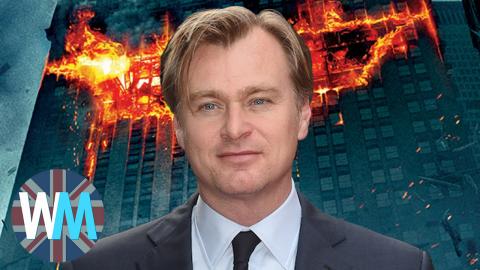Top 10 British Directors

They've orchestrated some of the most famous films in cinema, and flown the flag for British filmmaking in the process. Welcome to WatchMojo UK and today we'll be counting down the top ten British directors.
For this list, we'll' be focussing on the most influential directors from cinema that hail from the British Isles.
Special thanks to our users Ashley Birks, DunneNDusted, JosephT and Freemantle_uk for submitting the idea on our interactive suggestion tool: WatchMojo.comsuggest
#10: Steve McQueen
Although he’s still a fairly new name to many, McQueen has been on the peripherals of the industry for quite a while, making short films as far back as 1993. And although he only has a few big titles under his belt, they’ve been some doozies, and have all garnered a lot of attention - and featured Michael Fassbender. There was “Hunger” in 2008, “Shame” in 2011 and of course his most famous title “12 Years a Slave” in 2013 - a film which claimed the Academy Award for Best Picture.
#9: Nicolas Roeg
To say Roeg has been around the block is an understatement. Earning early credits as a cinematographer on the likes of “Lawrence of Arabia” and “The Masque of the Red Death”, Roeg went on to direct “The Man Who Fell to Earth”, “Performance” and the masterpiece “Don’t look Now”. He refined his art through the years and fashioned a unique, psychologically-challenging style, which has made his films some of the most memorable in cinema history.
#8: Guy Ritchie
Breaking into the film industry with his 1998 gangster classic “Lock, Stock and Two Smoking Barrels”, Guy Ritchie has since become synonymous with tongue in cheek crime epics. His unique style of violence and humour, as well as his ability to mix in pop culture references and killer soundtracks, has given him a distinct footprint on the silver screen. His smash and grab London gangster films soon led him to direct hits like “Sherlock Holmes” starring Robert Downey Jr. and 2017’s “King Arthur: Legend of the Sword”.
#7: Michael Powell
There’s an exclusive few responsible for building the foundations of psychological thrillers, one of which is Michael Powell. Known for his frequent collaborations with writer and director Emeric Pressburger, the dream team created some of cinema’s greatest, most revered and most studied films, including “The Life and Death of Colonel Blimp” and “A Matter of Life and Death” and of course the highly-controversial and groundbreaking “Peeping Tom”. Cited as inspiration for many other big-time directors, including Martin Scorsese and Francis Ford Coppola, his techniques are littered throughout many modern films.
#6: Danny Boyle
Trying his hand at many different genres, Boyle immortalised himself in the world of cinema back in 1996 with his second feature film “Trainspotting”. After directing other gritty entries like zombie flick “28 Days Later”, Boyle went on to head-up the highly-successful “Slumdog Millionaire”, which won eight Academy Awards, and other films like “127 Hours” and a Steve Jobs biopic. Boyle was even asked to be the artistic director for the 2012 Summer Olympics Opening Ceremony in London, a true honour for any Brit.
#5: Charlie Chaplin
Chaplin is a true example of a rags to riches story - and a multifaceted filmmaker. From the drudge of workhouses as a child, his early career consisted of stage acting, which eventually evolved to feature films with his iconic persona, “the tramp”. But Chaplin was more than just a slapstick comic character. Outside of starring, Chaplin directed and wrote most of his own films, as well as composed music for them. Mostly stepping in front of camera with nothing but a brief idea, his improvisational techniques have gone on to inspire numerous filmmakers.
#4: Christopher Nolan
This guy doesn't do things by halves. Known just as much for his writing as he is his directing, he put himself on the map in the year 2000 with his chronologically-shuffled “Memento”. Nolan then went on to take the reins of the Batman franchise in 2005 - spawning a highly-successful trilogy - and he is also responsible for a series of intricate, psychologically-charged sci-fi hits like “Inception” and “Interstellar”. When it comes to achieving awe-inspiring cinematic visuals, Nolan is one of the guys you call.
#3: David Lean
“Lawrence of Arabia”, “Doctor Zhivago”, “The Bridge on the River Kwai” - take your pick with this guy’s classics. Winning Best Director oscars for two of those films, David Lean is one of the pioneers of big-screen epics and his films have served as inspiration for countless masterpieces from filmmakers like Steven Spielberg and Stanley Kubrick. Delivering stunning visuals and dynamic performances from actors like Peter O’Toole and Omar Shariff, Lean was instrumental in bringing British cinema to the rest of the world.
#2: Ridley Scott
From tension-inducing glances and sound effects, to atmospheric lighting and intricately detailed sets, Ridley Scott’s films go the whole nine yards, and then some. Becoming the talk of sci-fi fanboys everywhere in the late 70s with “Alien”, Scott’s attention to detail and storytelling are legendary. From other sci-fi classics like “Blade Runner”, to battle-scene heavy “Gladiator”, and the crime-riddled “American Gangster”, Scott has dabbled in many different genres. Regardless of the genre, his films always boast flair.
Before we reveal our top pick, here are a few honourable mentions.
Ken Loach
Edgar Wright
David Yates
#1: Alfred Hitchcock
Ah yes, the “Master of Suspense”. If you want genuine, hair raising, goosebump and sweat-inducing thrills, then just watch one of Hitchcock’s many blockbuster hits. “Psycho”, “The Birds”, “Rear Window”, all examples of pioneering, Hitchcockian techniques at work, from unnerving camera angles to first person shots. Each of his films brews with a sense that anything could happen at any moment, creating his trademark thriller edginess. And who can forget his killer cameos?


